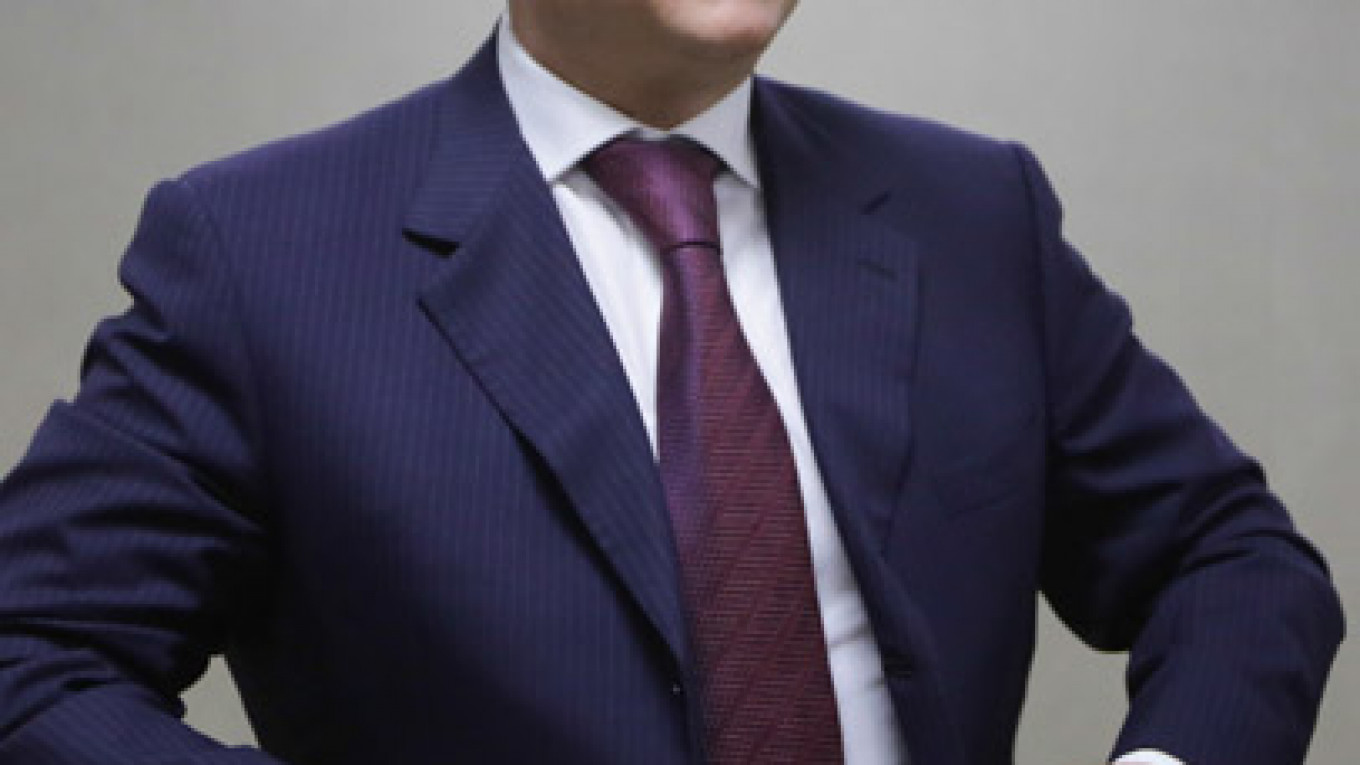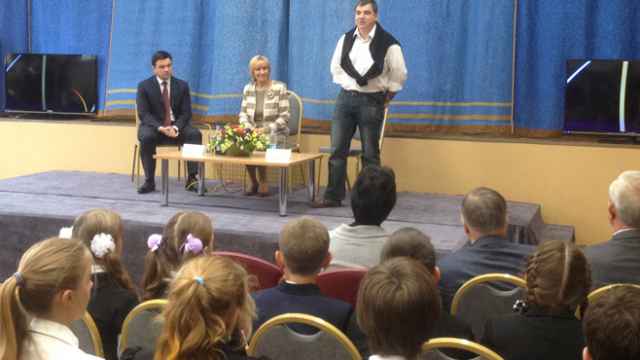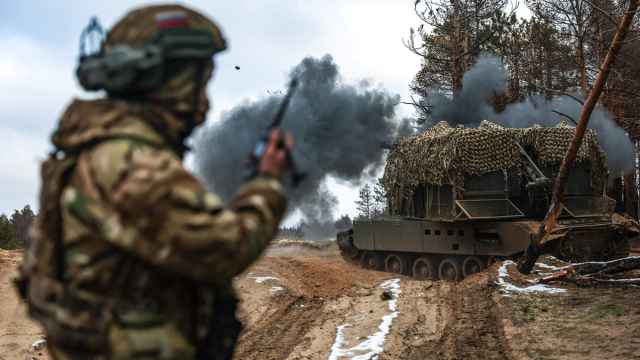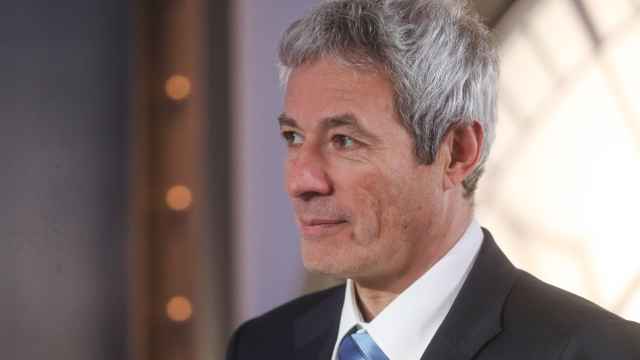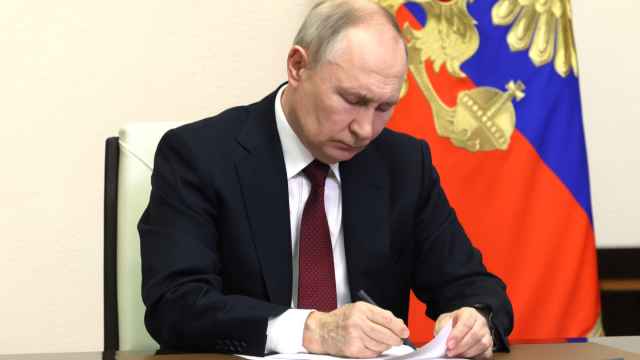To anyone wandering around Moscow's giant Manezh exhibition hall during the city's first International Culture Forum this month, it was obvious where the center of gravity lay.
Wherever there was a crowd of people, Moscow Culture Minister Sergei Kapkov was sure to be at its center. A group from the Dutch Embassy came to take a picture with him. A man came to give Kapkov his book and contact information, just in case the minister wanted to discuss it later.
Kapkov is behind everything that is new and trendy in today's Moscow: the new Gorky Park and other public spaces, the new pedestrian zones, new theaters, including the swanky Gogol Center, and more. These projects are all united in bringing a chic European aesthetic to the Russian capital, largely by copying the latest Western trends in urban planning, design and management.
In recognition of the scale of his influence, Kapkov was nominated for Person of the Year at last year's inaugural Moscow Times Awards.
Over the last three years, this transformation of the Russian capital has divided the public into those who cannot imagine how they survived before it and those who see the metamorphosis as an attempt to stifle dissent by offering politically conscious Russians a superficial Western-looking alternative.
But Kapkov, unconcerned by the debates that surround him, sees his mission in producing more engaged and better-paid professionals in Moscow. At the same time, he openly acknowledges that his initiatives are often at odds with Russia's cultural reversal to traditionalism and largely self-imposed isolation, a trend that has accelerated throughout the clash with the West over the crisis in Ukraine.
Speaking with The Moscow Times, Kapkov himself was not sure how much time he has left at his post. Today, he is busy managing the Culture Department's 56 billion ruble ($1.4 billion) budget for this year and is trying to continue his work as long as he can.
This interview has been edited for length and clarity.
Q: Moscow has changed a great deal visually, but do you believe Muscovites' mindset has changed as well? You have said that Moscow's main problems are aggression, alienation and the lack of a common idea. Have you managed to change this situation?
A: I think that very little has changed, but the more people we draw into culture, and the more we make people understand their role in society and in the city, the better it will be for Moscow.
Q: What are the results of this work?
A: The result is the people who come to this cultural forum — 5,000 people every day. They discuss things like literature museums, which were never discussed at all before. In Soviet times, we could not discuss anything. In the 1990s, we had no money, so there was nothing to discuss. Now we can discuss the future of literature museums, as well as topics such as culture and religion.

A mother and child investigating lamp formations at a revamped Gorky Park, Kapkov's most famous achievement.
Against the Tide
Q: It is often said that you are opposed to what is happening in Russia at large, what can be called the "traditionalist turn" in Russian politics. Why do your projects stand out so much in today's Russia?
A: I believe that my mission is to make it possible for more educated, professional, free, interesting and independent people to appear in Moscow. I am a big Russian patriot too, but I think that life in Moscow is not easy, people work a lot in a very tense rhythm. At the same time, everybody wants to be able to distract themselves from everyday life, to go to the theater, to learn how to paint, how to dance or play a musical instrument. To teach children how to do all these things. The city has to offer these services, and our mission is to do that.
Q: Your projects are often criticized for only embellishing Moscow city life and not changing its fundamental nature.
A: The fundamental nature does not have to change. The nature of a music school is to teach music. When, for instance, we introduce new standards that cultural establishments must look good, be fashionable and clean, we see that many adults come to these music schools too, not only children. Music schools become community centers and hubs.
Q: You have replaced 30 percent of the heads of cultural establishments in Moscow with what you have called "actual" or "hip" people. What is "hip" for you?
A: Hip people are the ones who can clearly formulate who they work for, what they do, what their theater is about, what their mission is. We appoint these people according to professional criteria alone. We do not have any artistic criteria — we hire managers.
Q: You have often said that what you do must make Moscow more tolerant. What do you mean by that?
A: Everyone in his own way must make the city more tolerant. Moscow is very big, and we cannot survive without each other.
Q: Why do you think Moscow is still so divided into various social groups?
A: Moscow has many common cultural codes, but they are not formulated well. This is what our forum is about: that there are no enemies, that people across the spectrum are all talented, and that people make culture for people of different backgrounds.
Q: Some Moscow theaters are clearly elitist, tickets to plays in these venues are very expensive. Do you think this situation only reinforces existing divisions?
A: I do not think there is anything wrong with this. We have 317 theaters in Moscow, 88 are managed by the Culture Department. Each theater declares its target audience and people have a choice.
Culture Above Politics
Q: You work inside City Hall and the Russian government. In light of the Ukraine crisis, decision-makers seem to think and act as if we live in a besieged fortress. To what extent is that true?
A: Judging by this forum, 46 out of 250 guests came from England, China, the U.S., Spain and so forth. You cannot impose sanctions on culture. Our theaters are invited to tour in Europe; our Western cultural partners come to tour here. Culture is above politics. It is bigger than politics.
Q: I am not just asking about formal sanctions, but people's attitudes.
A: The attitude toward Russian artists remains good abroad. Culture is above politics. Politics change every day. What Western political leaders think of us changes every day too, and we cannot adjust to it all the time.
Q: Why then is culture in Moscow often mingled with politics?
A: Because this is Moscow. It is the city that formulates the political, cultural and ideological agenda for all of Russia.
Q: Do you agree that in Russia culture is often substituted for politics and vice versa?
A: You cannot do so for long. People want to learn about the eternal: about the relationship between man and God, between men and women, about life and death, childhood and old age. Universal stories are more interesting for audiences. Ultimately, people want to learn more about themselves.

Skaters sliding on the elaborate, and fantastically popular, ice highways erected each winter in Gorky Park.
Moscow as a Global City
Q: What is Moscow for you, is it the Russian capital, most of all, or a global city?
A: Moscow is a global city, a city that contributes to the global political and cultural agenda.
Q: What can Moscow offer to the world today?
A: Moscow has to offer services to its citizens. If what we do is interesting to the 14 million people that live here, to several million Russian tourists, to about 5 million tourists from abroad, then this cultural product will be interesting to everybody.
Q: What does Moscow have to do to make itself relevant or fashionable on the world stage?
A: We have to make a special effort, so that life in Moscow is comfortable, safe and interesting. That is why our slogan is "Moscow: Live, Work, Create."
Q: Create what? What are the goals?
A: We do not set any goals. We create an environment where people are motivated to create anything: from cartoons to sandwiches. At the same time, what people do has to be skillful and also oriented toward other people.
Making Expat Life More Interesting
Q: Do you pay attention to Moscow as a city for expats? Do you want to attract more expats to Moscow?
A: This is usually connected with business. We have many expats, and we try to make all our programs international. We transcribe theater performances and work with British theaters. I believe that year by year, life in Moscow is becoming more attractive to expats. This is not only about culture, this also has to do with the atmosphere, with the energy of this city.
Many Westerners who come to live here are surprised by what Moscow is in reality. What they see is not what the media at home told them to expect. That is why we are trying to be as open as possible. We are inviting people to see the real situation here.
Q: Do you believe that the portrayal of Moscow abroad can be changed? Obviously, it has become even more difficult with the events in Ukraine.
A: Of course, but we need to be patient and explain who we are every day. We have to invite people and show them what Moscow is, we have to go to the West and give a taste of who we are there.
Q: But you cannot invite everybody here.
A: We have to invite opinion-makers. Slowly, it will change. I think this is already happening. We are on the international agenda. We participate in the global world through culture and social media. Moscow is gradually returning to the global cultural and emotional agenda.
Q: Moscow contributes to world culture, but world culture contributes to Moscow too. Here we often hear that what the world brings to Moscow and Russia is dangerous for national security. What do you think of that?
A: I think it is political twaddle. These ideas are voiced by politicians, not people of culture. These politicians can sincerely believe in what they are saying, but they will eventually admit that they were wrong.
Q: What do you think of The Moscow Times Awards?
A: I believe that in these difficult times, social capital is very important. Social capital is when people, media outlets and foundations say, "Thank you." I am a proponent of more awards because people should be rewarded for what they do.
Contact the author at i.nechepurenko@imedia.ru
A Message from The Moscow Times:
Dear readers,
We are facing unprecedented challenges. Russia's Prosecutor General's Office has designated The Moscow Times as an "undesirable" organization, criminalizing our work and putting our staff at risk of prosecution. This follows our earlier unjust labeling as a "foreign agent."
These actions are direct attempts to silence independent journalism in Russia. The authorities claim our work "discredits the decisions of the Russian leadership." We see things differently: we strive to provide accurate, unbiased reporting on Russia.
We, the journalists of The Moscow Times, refuse to be silenced. But to continue our work, we need your help.
Your support, no matter how small, makes a world of difference. If you can, please support us monthly starting from just $2. It's quick to set up, and every contribution makes a significant impact.
By supporting The Moscow Times, you're defending open, independent journalism in the face of repression. Thank you for standing with us.
Remind me later.


